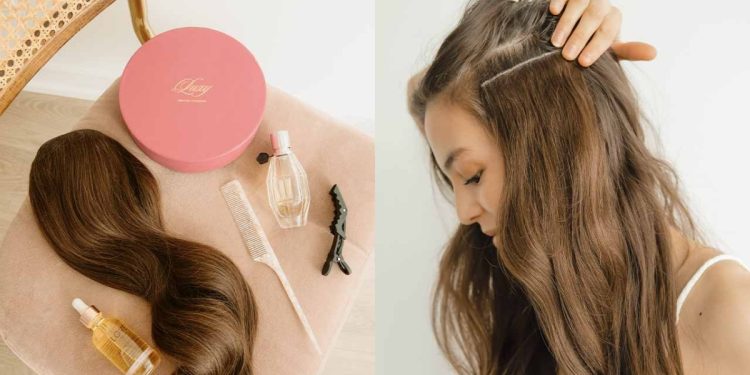The beauty industry has witnessed a noticeable shift since the pandemic, with consumers increasingly investing in self-care and aesthetic enhancements. Among these, hair extensions have seen a remarkable surge in demand as people look to elevate their look with ease and convenience. With more individuals prioritizing personal style and finding creative ways to transform their appearance, the hair extension market is evolving rapidly. Whether it’s the appeal of DIY styling, the impact of social media, or the rise of innovative new products, hair extensions have become a staple in the post-pandemic beauty routine. This article explores the key factors driving this growth and how brands are rising to meet consumer expectations in an ever-evolving landscape.
The Rise of DIY Styling and Versatile Extensions
One of the most significant drivers of growth in the hair extension market is the shift towards DIY styling. After the pandemic led many people to experiment with at-home beauty solutions, the trend of self-styling has continued to thrive. Hair extensions, especially clip-in varieties, offer a user-friendly option for those looking to create a professional look from the comfort of their own home. Relaxed Straight Hair Extensions, for example, have become popular for their natural appearance and ease of use, allowing people to achieve a polished look without extensive salon time.
These accessible and manageable extensions have resonated particularly well with those seeking versatility in their hairstyles. Extensions can add length, volume, and color variety, allowing users to customize their style based on mood or occasion. This flexibility appeals not only to those aiming for glamorous transformations but also to individuals seeking everyday looks that are manageable and sustainable. As more consumers prioritize beauty routines that fit seamlessly into their lifestyles, the demand for extensions that provide easy application and natural-looking results continues to grow.
Empowering African Female Entrepreneurs in the Hair Industry
In addition to the DIY movement, the rise in demand for hair extensions has presented new opportunities for African Female Entrepreneurs in the beauty industry. Many of these entrepreneurs are capitalizing on the growing interest in extensions, offering products that cater to diverse hair textures and styles. With the global rise in demand for inclusive and culturally-representative products, entrepreneurs from Africa and other regions are redefining the beauty landscape by prioritizing representation and quality in their offerings.
These businesswomen are not only meeting the needs of local markets but are also making strides on the global stage. By tapping into the cultural knowledge and unique styling preferences of African hair types, they bring authenticity and depth to their brands. As more consumers seek out products that align with their cultural identity and personal style, African entrepreneurs play a crucial role in bridging gaps within the hair extension market. The support for their businesses has been a meaningful way for consumers to champion diversity and support sustainable business practices in the beauty industry.
The Influence of Social Media and Beauty Trends
Social media has undoubtedly amplified the popularity of hair extensions, making it easier for consumers to discover and experiment with new looks. Platforms like Instagram, TikTok, and YouTube are filled with influencers and everyday users showcasing transformative hairstyles, many of which involve extensions. These visuals provide instant inspiration and give viewers a tangible sense of how different types of extensions can enhance their look. As a result, the accessibility and appeal of extensions have reached new heights.
Moreover, social media has fostered a space where brands can directly interact with consumers, allowing them to receive immediate feedback on new products and trends. This dynamic has created a fast-paced environment where companies are constantly innovating to keep up with the latest demands. Whether it’s through trend-driven content, tutorials, or influencer collaborations, brands are using social media to demonstrate the value of their products and highlight how extensions can be seamlessly incorporated into everyday style.
Adapting to Consumer Expectations: Quality and Sustainability
As the demand for hair extensions grows, so do consumer expectations around quality and sustainability. Today’s buyers are increasingly discerning, often seeking products that not only look natural but are also ethically sourced and manufactured. This shift has led to an increase in brands prioritizing transparency in their supply chains, using sustainable materials, and opting for environmentally friendly packaging. For many consumers, it’s not just about appearance anymore; it’s about choosing products that align with their values.
Brands are responding by offering options that cater to these expectations. Some companies now provide ethically sourced hair options, including extensions made from recycled or cruelty-free materials. Additionally, more brands are adopting biodegradable packaging solutions, further appealing to eco-conscious buyers. This alignment between brand values and consumer priorities is helping hair extensions evolve into products that aren’t only functional but also ethical and sustainable.
The Future of Hair Extensions in a Shifting Market
The hair extension market shows no signs of slowing down as it adapts to the evolving preferences of post-pandemic consumers. The demand for diverse, versatile, and high-quality products continues to fuel industry growth, with innovations in texture, application methods, and customization driving expansion. As brands increasingly cater to unique hair needs and incorporate sustainable practices, the hair extension market is set to become more inclusive and environmentally friendly.
The future of extensions will likely include more specialized products tailored to distinct hair types and preferences, allowing individuals to express their style authentically and effortlessly. As more people explore the world of hair extensions, brands will need to keep up with consumer demands for products that blend style with convenience, quality, and environmental responsibility.






